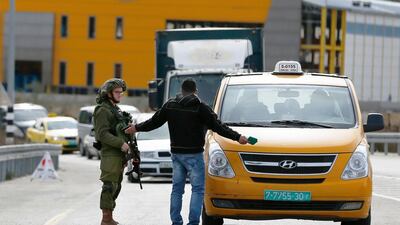Ramallah // Israel restricted access to the Palestinian political capital of Ramallah in the occupied West Bank early on Monday after a checkpoint shooting wounded three soldiers.
The military said that after “situation assessments”, only residents of Ramallah could enter and only residents of other cities and humanitarian cases would be allowed to leave until further notice.
More than 160 Palestinians have been killed by Israeli forces in the past four months, most while carrying out alleged attacks and others during clashes and demonstrations. Most of the attacks have been stabbings, and the alleged attackers have been shot dead. About 25 Israelis have been killed during the same period.
Israel’s latest move is the first time access to Ramallah has been restricted since the wave of violence began in October.
The restrictions also apply to foreigners, although United Nations officials, international NGOs and diplomatic staff were exempted.
Palestinians queuing to leave Ramallah said they considered the measure collective punishment for Sunday’s attack when a Palestinian guard for the attorney general’s office in Ramallah opened fire at a checkpoint outside the city.
Three Israeli soldiers were wounded before the alleged assailant was shot dead.
The shooting near Ramallah, where the Palestinian Authority is based, marked at least the second time a Palestinian security officer has been implicated in an attack in the current wave of violence.
A large number of Palestinians, aid workers and diplomats commute to Ramallah on a daily basis.
“The travel restriction on Palestinians is having an effect in terms of our ability to engage,” a western diplomat said.
“A number of meetings have been called off because Palestinian interlocutors have not been able to get to the meeting site.”
One woman in her 30s waiting in a taxi gave her name as Aline and said she was missing a court date in Nablus in the northern West Bank.
“The question is until when this will happen?” she asked.
“Every time someone has a gun and goes to shoot the Israeli army? Neither the [Palestinian] president is harmed or anyone else. Only the people are harmed.”
A military source said he did not expect the restrictions to be in place for an extended period.
Enforcement of the restrictions varied significantly yesterday. Checkpoints near Jerusalem remained open and appeared to be operating normally.
Israeli prime minister Benjamin Netanyahu on Sunday lashed out at Palestinian president Mahmoud Abbas on his Facebook page, saying he “has not condemned this attack that was carried out by one of his men”.
The checkpoint where Sunday’s shooting occurred was closed yesterday.
Several other roads connecting Ramallah with the northern West Bank were also closed or restricted.
At one checkpoint, soldiers were checking cars leaving but not those entering.
Many analysts say Palestinian frustration with Israel’s occupation of the West Bank, the growth in illegal settlements on occupied land, the complete lack of progress in peace efforts and their own fractured leadership have helped feed the unrest.
Israel blames incitement by Palestinian leaders and media as a main cause of the violence.
Many of the attackers have been young people, including teenagers, who appear to have been acting on their own.
The Ramallah restrictions seemed to indicate a harsher response to the violence by Israel, with Mr Netanyahu under political pressure over his government’s failure to halt the attacks.
There have been warnings, including from Israeli security officials, that imposing heavy restrictions on Palestinians could further inflame the violence and lead to a full-scale uprising.
* Agence France-Presse and Associated Press

